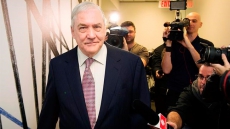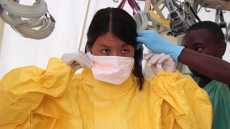TORONTO — Canadians may dream of retiring debt-free, but research done for Manulife suggests nearly 20 per cent of homeowners expect to lean on the value of their homes to finance life after work.
An online survey conducted for the financial services company found about half of the 2,373 respondents expected to still be in debt when they retire.
Of those polled, 10 per cent planned to borrow against their current homes, while about eight per cent were looking to downsize and use money from the sale of their home as income.
Using home equity as a "fallback plan" suggests some Canadians are struggling to balance retirement with paying down debt, Manulife Bank CEO Rick Lunny said in an interview.
"If people think they're going to take out second mortgages and larger mortgages when they retire, that's a pretty concerning view and evidence of no financial plan whatsoever," Lunny said.
"These people, if they're going to retire with mortgage debt on their homes, there's significant risk that interest rates will go up in the future."
The Manulife survey also found that many still struggle with financial literacy. For example, one-quarter of respondents didn't consider mortgages or auto loans to be part of their overall debt.
Older respondents were less confident in their retirement goals and about half planned to continue working full-time or part-time to extinguish their debt, the survey said.
Manulife's findings come after years of warnings from the Bank of Canada and the federal Finance Department that many people are still amassing too much debt.
Throw in concerns that Canada's housing market may be overpriced, and the likelihood that interest rates will rise in the coming years, and several additional levels of risk could be introduced into the financial equation.
 "
"
Canadians have been lulled into this sense of security because they're paying three per cent or less on their mortgages, but that could change very quickly," Lunny said.
"People don't have long memories and if their only reference period is the last five years or so, since the financial crisis, they better be prepared for it."
Debt problems are nothing new for most Canadians and neither are the surveys which conclude that most people aren't properly saving for the future.
TD Insurance released findings last month which said 39 per cent of Canadians would run into financial problems if they were forced to stop working due to a sudden illness. The figure rose to 44 per cent for respondents under the age of 35.
Taking advantage of housing wealth in retirement isn't necessarily a bad decision, suggested Thomas Davidoff, an assistant professor at the Sauder School of Business in Vancouver.
"What I think, arguably, would be crazy is to live a meagre retirement and not have tapped an enormous asset," he said.
"It really depends on how important it is for you to leave wealth to your heirs, and how nervous you are about surprise expenditures."
He said that borrowing on a home is better choice than turning to high interest rate credit cards.
"I don't care what rates do, it's never more expensive to owe on a home equity line or reverse mortgage," he said.

"The online survey, conducted by data collection agency Research House, polled Canadian homeowners between the ages of 20 and 59, with a household income of $50,000 or more, from Sept. 8 to Sept. 19.
The polling industry's professional body, the Marketing Research and Intelligence Association, says online surveys cannot be assigned a margin of error as they are not a random sample and therefore are not necessarily representative of the whole population."




